

Protect Our Environment and Controlling Climate Change
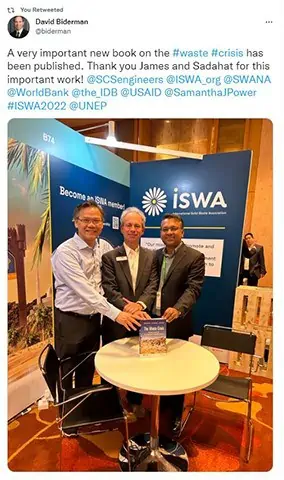
Featured speakers included Alex Stege and his Solid Waste Emissions Estimation Tool (SWEET) used in a project in Tyre Caza, Lebanon. SWEET allows solid waste planners to compare emissions from implementing different programs and quantify the effectiveness of available waste management options in reducing emissions of GHGs and air pollutants.
Alex presented during the Waste Management In An Era Of New Energy track. His discussion covered Evaluating the Energy Potential of 16 Landfill Gas to Energy Projects in China to be financed by the International Finance Corporation (IFC). There are 24 landfill gas-to-energy projects in China, including ten sites already under operation. In 2021, IFC hired SCS Engineers to evaluate the NCWI estimates and prepare a report providing independent LFG generation and recovery projections for the 16 landfills. The project developer (NCWI) provided IFC with waste data and LFG generation and recovery projections for 16 of their project site landfills from the report indicating a sufficient supply of recoverable LFG to support their planned facility capacities.
SCS Engineers was asked to comment to the NWRA and SWANA industry groups in their October 6 letter to U.S. Environmental Protection Agency on the proposed new EPA rule changes for GHG reporting. SCS’s deep expertise and knowledge of GHG monitoring and reporting, especially GHG rule k values, help inform the revisions and determinations for data elements under the Greenhouse Gas Reporting Rule. Ref. Docket ID No. EPA-HQ-OAR-2019-0424.
It is wonderful to see ISWA and SWANA in leadership roles to help us meet a global challenge!

Suzanne doesn’t stop there; she continually evolves her programs and participates in association speaking opportunities to share successful strategies throughout North America at Solid Waste Association of North America (SWANA) events and others. Her focus has been proactively identifying hazardous landfill and landfill gas situations and presenting unique and successful solutions she has developed for SCS. But, as the number of MRFs and Transfer Stations is expected to increase, those areas have become safety focus areas.
The industry is seeing a reduction in workplace fatalities based on the most recent U.S. Department of Labor’s Bureau of Labor Statistics, but there is more work to do. “Solid waste is a dangerous industry, and we collectively work to bring awareness to those most vulnerable to injury or worse,” said Sturgeon. “As an industry, we have the tools and more on-demand training to help reach more workers before problems occur to continue making our industry safer.”
As the SWANA National Safety Committee Chair, Suzanne is working hard and smart in the field, keeping up with new systems, equipment, and facilities that need her particular skills and insight to keep worker fatalities and injuries on the downward trend. Her innovative training and ability to communicate with so many saves lives.

Greg’s 35 years of experience include operations, project management, design, permitting, regulatory support, construction oversight, system start-up, economic analysis, and technology assessment to find the right system and the proper mix for sustainable composting operations.
Among his successful innovative projects, there are award winners for demonstrating composting operations can be in urban areas, conveniently coexisting with buildings and people, even tucked under a bridge in New York City.
He created an Aerated Static Pile (ASP) composting pilot program so that municipalities and businesses could evaluate their organic waste streams to determine whether composting is a viable solution before making a capital investment.
And he is leading the design of hybrid composting approaches that combine an ASP system with other technologies, such as open windrows. These hybrid systems can achieve necessary process control while maintaining cost efficiencies. The designs depend on the priority challenges unique to each project — processing increasing tons of food scraps, for example, but change as priorities differ within programs. Sustainability means the systems are flexible enough to adapt to waste trends and the end market, which demands various high-quality mixes to sell.
Greg says, “the advancements mentioned above help support sustainable composting and organics management because they account for changes that may occur over the life of the systems, such as waste characteristics and their relation to the end-product demand.”
SWANA is optimistic regarding the positive role modern MSW landfills can play in managing solid waste – such as carpeting and clothing – containing PFAS. By disposing of these products in landfills and effectively treating landfill leachate for PFAS removal, the solid waste industry can provide society with an effective and proven method of managing PFAS wastes.
In support of members, the SWANA Applied Research Foundation (ARF) has issued a report summarizing and analyzing management options and treatment technologies that can address PFAS chemicals contained in landfill leachate on November 10, 2021. PFAS Management and Treatment Options for Landfill Leachate is available to SWANA ARF subscribers.
The research findings presented in the resulting report are based on a comprehensive review of the literature and an analysis of the commercially-available PFAS treatment systems and other management options for landfill leachate.
The new report serves as a companion report to one published by the ARF in June 2021 on PFAS Fate and Transport in WTE Facilities, available in SWANA’s Reports List.
We could not resist sharing this picture!
SWANA’s WASTECON® helps public sector solid waste leaders and their teams plan sustainable futures for their communities. The conference is curated especially for solid waste leaders to immerse themselves in the latest executive topics.
See you there!
The International Awards Committee and Solid Waste Association of North America (SWANA) Board of Directors unanimously voted to honor Tom Conrad, the “C” in SCS, with the Robert L. Lawrence Distinguished Service Award at WASTECON 2021 in November. The Lawrence award is the highest accolade SWANA bestows on a member of the waste management industry, reserved for those making meaningful and lasting contributions.
“I’m honored and humbled to be selected for the Robert L. Lawrence Award. I thank you and am especially thankful for what SWANA and SCS are today,” stated Tom Conrad.
SWANA recognizes Conrad for over 60 years of significant influence on the waste management and environmental services industry. Conrad, a Founder, Executive Vice President, and Director Emeritus of SCS Engineers, dedicated his career to advancing solid waste management, most notably through the founding of SCS Engineers (Stearns, Conrad, and Schmidt Consulting Engineers) more than 51 years ago.
Tom Conrad worked on a wide range of environmental engineering projects touching almost every aspect of solid waste management throughout his career. As an environmental engineering firm and consultant to the newly created US Environment Protection Agency (EPA), the founders recognized that responsible solid waste management was increasingly important for protecting the environment and the health and safety of the general public.
Leading SCS, he helped the EPA develop the first federal regulations for sanitary landfills, managing and capturing landfill gas, waste sorting protocols, sludge management, and land remediation.
Environmental services, including wastewater management, were always a significant part of SCS services and the waste industry. When new regulatory policies began expanding in the ’80s, SCS’s techniques, technology, and expertise helped a broad range of industries comply with environmental needs and continues today with the firm’s greenhouse gas, landfill technology, renewable energy, remediation, and sustainable materials management programs.
Conrad is also known for hiring and mentoring today’s SCS leaders, many of whom are SWANA leaders, by creating and fostering SCS’s culture encouraging employee participation in industry associations, community, and SCS’s mentorship and leadership programs.
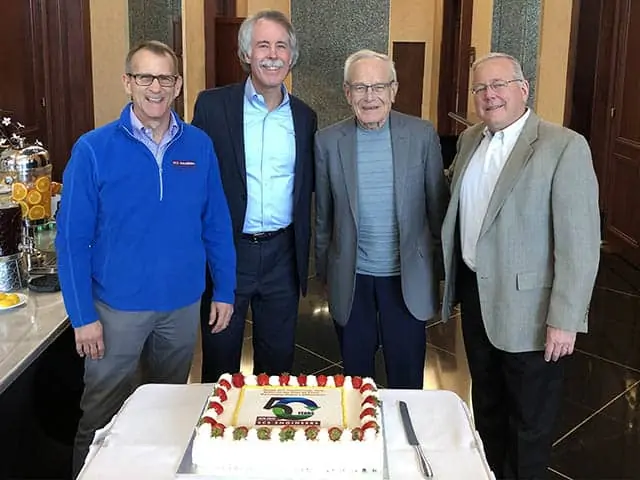
Before his retirement in 2016, Conrad held professional engineering licenses in 24 states. He was a member of SWANA, the American Society of Civil Engineers, the National Waste and Recycling Association, and the Society of American Military Engineers.
He maintains his “work hard – play hard” lifestyle. He is active at SCS, participating in Board of Director meetings and speaking at the Young Professionals Group events and celebrations. While no longer mountain climbing and biking cross-country, he has a vigorous walking, swimming, and biking schedule.
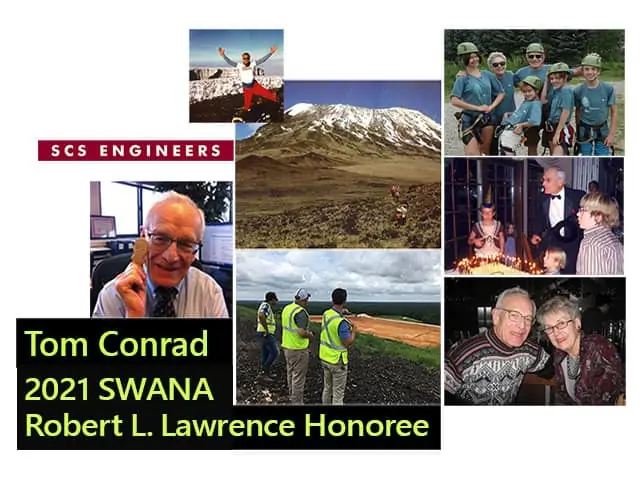
The findings of the studies reviewed in this report are encouraging concerning the ability of today’s U.S. WTE facilities to effectively treat solid waste that contains PFAS and not emit detectable levels of PFOA in the process. For the formation of PICs, the pilot-scale investigation conducted at the Karlsruhe Institute of Technology is encouraging in its findings that the combustion of PTFE did not create any of the 31 types of PFAS suspected of being potential PICs produced during the combustion process.
In conclusion, based on this research, SWANA is cautiously optimistic regarding the role of WTE facilities in the destruction of PFAS in MSW. The thermal destruction of PFAS in high-temperature combustion systems such as WTE facilities may represent one of the few commercially proven options available to society to destroy these problematic, forever chemicals.
The full report, PFAS Fate and Transport in Waste-to-Energy Facilities, is currently only available to SWANA ARF subscribers. SWANA members receive free access to ARF industry reports one year after publication; the abstract is available online and worth reading.
SWANA recently announced the winners of the SWDC competition hosted by SWANA’s Young Professionals Group. The competition aims at providing design experience to students interested in pursuing an education or career in solid waste management. The outcome is that all participants are winners, gathering real-world experience to help solve complex solid waste management issues in a supportive environment.
Seven universities participated in the competition: Arizona State University, Wayne State University, University of Southern California, University of Vermont, the University of Texas at Arlington, University of British Columbia, and the National University of Engineering in Peru.
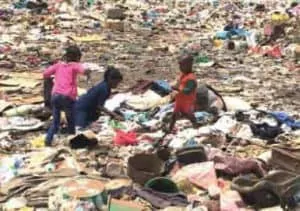
“Our team of judges was impressed with how this group of student design teams engaged in understanding this solid waste challenge plaguing The Gambia,” Competition judge and SCS Engineers Project Manager, Chris Jimieson, says. “The students developed diverse designs that we believe will become part of the eventual solution of constructing The Gambia’s first engineered, sanitary landfill.”
The judging panel included John Welch, Director of the Dane County Department of Waste & Renewables; Kaba Bah, Principal Manager at the Midwest GOOH Group in Madison, WI; Lamin Sanyang, Director of Services at Kanifing Municipal Council in The Gambia; and our own Chris Jimieson. The judges have a long association with the Bakoteh Dumpsite.
The SWANA Awards Ceremony features two guest speakers, including David Biderman, CEO and Executive Director of SWANA, and Mayor Talib Ahmed Bensouda, Lord Mayor of the Kanifing Municipality, The Gambia. Mayor Bensouda explains in the video how the Bakoteh Dumpsite became a significant problem for the growing community and the solutions they are using to fix it.
Chris Jimieson provides us with an update from his travels to The Gambia in Africa to evaluate their solid waste challenges.
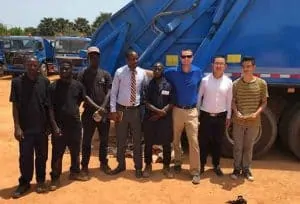
In October 2020, I presented The Gambia situation as a design project to college students worldwide that wanted to compete in the SWANA YP’s International Solid Waste Design Competition. We asked them to provide a closure plan for the Bakoteh Dumpsite, provide a conceptual design for a new sanitary landfill, and share some cost estimates for each of these endeavors. Seven teams from across the Americas decided to compete. If you are interested, please browse through student design posters, reports, and presentations or contact me, Chris Jimieson.
Thanks to the SWANA YPs, my SCS colleagues, and so many who volunteered to help elevate this project to the international stage.
EPA is releasing the interim guidance for public comment. The guidance provides information on technologies that may be feasible and appropriate for the destruction or disposal of PFAS and PFAS-containing materials. It also identifies needed and ongoing research and development activities related to destruction and disposal technologies, which may inform future guidance.
The interim guidance addresses PFAS and PFAS-containing materials including:
The agency is also providing guidance on testing and monitoring air, effluent, and soil for releases near potential destruction or disposal sites. EPA’s interim guidance captures the significant information gaps associated with PFAS testing and monitoring and identifies specific research needs.
The interim guidance is intended to assemble and consolidate information in a single document that generally describes thermal treatment, landfill, and underground injection technologies that may be effective in the destruction or disposal of PFAS and PFAS-containing materials.
As further research and development occur on this issue, EPA will incorporate this increased knowledge into future versions of this guidance to help decision-makers choose the most appropriate PFAS disposal options for their particular circumstances. EPA will review and revise the interim guidance, as appropriate, or at least once every 3 years.
See the EPA website: EPA Interim Guidance on Destruction and Disposal of PFAS.
Instructions: All submissions received must include Docket ID No EPA-HQ-OLEM-2020-0527 for this rulemaking. Comments received may be posted without change to the Federal eRulemaking Portal. You may send comments by any of the following methods:
According to Waste Dive, the document is the first such federal guidance on the destruction or disposal of PFAS or PFAS-containing materials. It describes the available science used in three major techniques: deep well injection, landfilling and thermal treatment. Acknowledging uncertainty about potential environmental effects, the EPA proposed the interim storage of PFAS-containing waste until further research can “reduce the uncertainties associated with other options.”
Industry groups such as the National Waste & Recycling Association (NWRA) and the Solid Waste Association of North America (SWANA) said they are analyzing the document and discussing with their members, such as SCS Engineers what the interim guidance means for daily landfill operations. The trade groups will submit comments on the document by the Feb. 22 deadline.
President, Michele Nestor
Vice President, Denise Wessels
Secretary, Tom Lock
Treasurer, Matthew Foltz
Private Sector Directors: Jill Hamill, Carolyn Witwer
Public Sector Directors: Scott McGrath and Scot Sample
Young Professionals Director: Brandon Comer
Chapter International Board Member: Robert Watts
The Solid Waste Association of North America – SWANA organization is comprised of public and private sector professionals committed to advancing solid waste management, safety, and resource management through their shared emphasis on education, advocacy, and research. Keystone SWANA serves industry professionals through technical conferences, certifications, publications, and a large offering of technical training courses which in turn keep our communities and environmental resources healthier.
SWANA is offering educational sessions as a webinar series with CEUs available from August through November. Register for just a few or pay one flat fee to participate in as many as you would like.
This week’s Webinar is on Thursday, October 1 at 10:00 am ET, 1 CEU.
State-of-the industry practices pertaining to the design, construction, operations, monitoring, and data analytics of LFG collection and control systems, as well as investigation of the quantity (mass flux) of fugitive (uncollected) LFG emissions.
Webinar Schedule and Registration
This 1 hour SWANA Training includes topics on Landfill Gas Emissions. Register through the VRA/SWANA Webinar Series. If you’d like to learn more about the services and technologies discussed during this session, try one of these links: